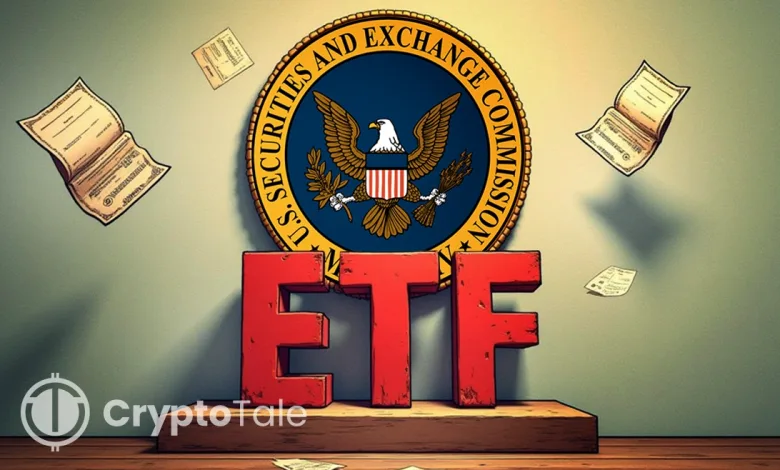The Role of the SEC in Maintaining Trust & Stability in ETF Markets

Exchange-Traded Funds (ETFs) are widely used investment tools, offering a way for investors to access a variety of assets through a single fund. As ETFs have grown in popularity, the U.S. Securities and Exchange Commission (SEC) has taken on the responsibility of regulating this market.
The SEC’s role is to ensure transparency, protect investors, and maintain order in the market operations. This includes overseeing ETF registration, monitoring fund disclosures, and addressing new developments like cryptocurrency ETFs.
What Are ETFs and Crypto Spot ETFs?
Exchange-Traded Funds (ETFs) are investment vehicles that allow individuals to gain exposure to a diversified set of assets, such as stocks, bonds, or commodities, through a single fund. Traded on stock exchanges like individual stocks, ETFs offer liquidity and accessibility, making them a popular choice among investors.
Types of ETFs:
- Index-Based ETFs:
These ETFs track the performance of a specific index, such as the S&P 500 or the NASDAQ-100. They are passively managed and designed to replicate the index’s returns, offering low-cost exposure to broad markets. - Actively Managed ETFs:
Unlike index-based ETFs, actively managed ETFs have portfolio managers making strategic investment decisions to achieve specific goals. These funds aim to outperform the market but come with higher fees. - The Emergence of Crypto Spot ETFs:
Crypto spot ETFs are a newer addition to the ETF market. These funds are designed to track the real-time price of cryptocurrencies, such as Bitcoin or Ethereum, by holding the actual underlying assets.
Crypto spot ETFs simplify cryptocurrency investing by offering a regulated and secure way for investors to gain exposure without the need to manage private keys, wallets, or direct cryptocurrency purchases. For example, a Bitcoin spot ETF holds Bitcoin directly in custody, and its value fluctuates based on the real-time market price of Bitcoin.
Benefits of Crypto Spot ETFs:
- Ease of Access: Investors can trade cryptocurrencies through traditional brokerage accounts.
- Regulated Framework: Spot ETFs operate under the SEC’s oversight, offering more transparency and investor protections compared to unregulated crypto markets.
The SEC’s Role in Regulating ETFs
The SEC plays a critical role in overseeing ETFs to ensure they operate transparently and fairly. As ETFs have become a popular choice for investors, the SEC’s regulations are designed to protect investors, promote market stability, and prevent fraudulent practices.
1. Registration and Disclosure Requirements
All ETFs in the U.S. must register with the SEC under the Investment Company Act of 1940. This process ensures that ETFs comply with strict guidelines regarding their structure, management, and operations. The SEC also requires ETFs to provide detailed disclosures about their investment objectives, strategies, risks, and fees. These disclosures enable investors to make informed decisions when choosing funds.
2. Rule 6c-11 for ETFs
In 2019, the SEC introduced Rule 6c-11, commonly known as the “ETF Rule.” This regulation streamlines the approval process for new ETFs, allowing funds that meet certain criteria to launch without obtaining individual exemptive relief. The rule ensures consistency across the ETF market, making it easier for fund providers to bring new products to investors while maintaining regulatory oversight.
3. Monitoring Fund Operations
The SEC monitors ETF operations to ensure they adhere to their stated investment strategies and do not engage in misleading practices. This includes oversight of trading practices, derivatives usage, and compliance with liquidity requirements.
4. Oversight of Crypto Spot ETFs
The SEC’s role in regulating crypto spot ETFs is particularly important. These funds must meet the same rigorous standards as traditional ETFs, including custody of assets, pricing transparency, and risk management. The SEC closely evaluates applications for new crypto spot ETFs to balance innovation with investor protection.
Through its regulatory framework, the SEC ensures that ETFs remain a reliable and accessible investment option, fostering trust and confidence in the financial markets.
Market Surveillance and Investor Protection by the SEC
The SEC’s oversight of ETFs extends beyond their initial approval and registration. The commission actively monitors the market to ensure fair trading practices and safeguard investor interests. This ongoing surveillance is essential for maintaining the integrity of the ETF market.
1. Market Surveillance Programs
The SEC uses a surveillance program to monitor ETF trading activities. These programs are designed to detect unusual or suspicious trading patterns that may indicate market manipulation, insider trading, or other fraudulent activities.
2. Preventing Fraudulent Practices
Fraudulent schemes, such as false advertising or misleading performance claims, pose significant risks to investors. The SEC actively investigates and takes enforcement actions against fund managers or entities that violate securities laws. For example, the SEC has penalized firms for failing to disclose material risks or providing inaccurate information about ETF holdings and strategies.
3. Protecting Retail Investors
ETFs are widely used by retail investors due to their accessibility and lower costs. The SEC prioritizes the protection of these investors by enforcing rules that ensure transparency in fund operations, fees, and risks. This includes requiring ETFs to provide clear and comprehensive prospectuses, so investors understand what they are buying.
4. Crypto Spot ETF Monitoring
With the emergence of crypto spot ETFs, the SEC’s surveillance has expanded to include the unique risks associated with these funds. This includes ensuring that the custody of digital assets is secure, pricing mechanisms are transparent, and funds comply with anti-money laundering (AML) and counter-terrorism financing (CTF) regulations.
5. Educating Investors
In addition to regulatory enforcement, the SEC focuses on investor education. Through resources like Investor.gov, the SEC provides tools and information to help individuals make informed decisions and understand the risks of ETFs, including crypto-related funds.
Conclusion
The SEC plays a vital role in overseeing the ETF market, ensuring transparency, fairness, and investor protection. From the registration and disclosure requirements for traditional ETFs to the rigorous evaluation of emerging products like crypto spot ETFs, the SEC’s regulatory framework is designed to maintain trust in these investment vehicles.
Through initiatives such as Rule 6c-11, market surveillance programs, and enforcement actions against fraudulent practices, the SEC works to create a stable environment for investors. Its focus on education further empowers individuals to make informed decisions, fostering confidence in the ETF market.




